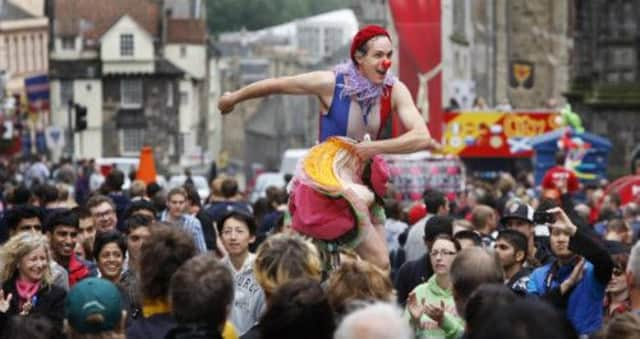Edinburgh Festival Fringe elitist, director claims


• Producer and director Pippa Bailey claims Edinburgh Festival Fringe is dominated by “posh English blokes”
• Ms Bailey says “very white and middle class” Fringe is exploiting artists paying way beyond their means to put on shows at the festival
Advertisement
Hide AdIn a damning critique of the event, Pippa Bailey, former producer of one of the flagship awards at the event, said she wanted to trigger a major debate on how artists were being exploited by a Fringe that was “very white and middle class”.
Ms Bailey also warned that the festival was suffering as a microcosm of the wider UK and global economy, which artists driven by “hope and desperation” and prepared to spend way beyond their means and make huge losses.
Ms Bailey, who was born in London, but was raised and initially worked in Australia, claimed a reticence to “rock the boat” was preventing any change to the current economics of the Fringe, including charges levied by Edinburgh University for the use of dozens of its buildings.
Her views have emerged just days before another leading figure from the English arts scene, Mark Ravenhill is due to give the first ever “opening address” at the Fringe to performers taking part in the event.
This year’s Fringe is bigger than ever before, with more than 24,000 artists taking part in 2871 shows across 273 venues, with the number of productions up 6.5 per cent in the space of 12 months.
However, in a series of talks at the Summerhall arts centre, Ms Bailey will next month call for the Fringe to instigate a rethink of the whole event, claiming “the spirit of adventure and enquiry seems to have all but left the festival.”
Advertisement
Hide AdIn a statement issued yesterday, she said: “As a microcosm of wider society, the fringe system mirrors an unstable economy, a sub-prime market waiting to implode. Artists are prepared to spend beyond their means and operate at a loss. Hope and desperation drive this bubble economy.
“This has serious implications for the sector, as the huge cost of producing shows in Edinburgh prevents many from participating, thus reinforcing the elitism for which theatre is already renowned.
Advertisement
Hide Ad“And although this is an international Festival in Scotland, posh English blokes run most of the major venues. Edinburgh is very white and middle class.”
Ms Bailey claims she had lost faith in the Fringe by last year, after the sixth Total Theatre Awards she had been at the helm of, claiming the Fringe had become a “monstrous machine” which was suffocating artists and shows in its excess.
She added: “The growth agenda of all major parties, including the Festival Fringe Society, echoes the unsustainable growth model unsuccessfully driving the UK (and world) economy.
“Not only are a relatively small percentage of the performers paid, but also audiences can less afford to take risks or see as many performances as they once did, so the culture becomes increasingly conservative - a worrying sign of the times.
“Artists become co-opted into the economic reality rather than focusing on asking difficult questions and pushing the creative envelope.”
Anthony Alderson, artistic director of Pleasance, the biggest promoter at the Fringe, said: “The stark reality is that virtually no-one is making huge amounts of money at the Fringe.
Advertisement
Hide Ad“The economics are largely the same as they were 20 or 30 years ago. People tend to forget that a huge investment is needed in venues every year to get them ready for shows. The vast majority of the money made at the Fringe actually stays in the city.”
William Burdett-Coutts, artistic director of Assembly Theatre, the longest-running promoters at the festival, said: “We take a huge risk every year on bringing shows to Edinburgh and we are producing around 40 this year, many of which would simply not come if they didn’t get that support.
Advertisement
Hide Ad“I think the Fringe economy is fragile and hangs by a whisker at times, but I don’t think is broken. That won’t happen until people stop going to shows or we stop producing excellent work, and that’s certainly not the case this year.”
Karen Koren, founder of Gilded Balloon, said: “I would love it if more of the venues were run by people from Scotland, but the fact is that people from England were doing it first.
“The problem at the moment is there are actually less people going to theatre shows across the country at the moment, which is down to the wider economic situation. The Free Fringe makes it a bit easier in Edinburgh for new comedians.”
Tommy Sheppard, director of The Stand and Assembly Rooms, said: “The Free Fringe allows many solo performers the chance to stage a show with minimal overheads and by passing the hat often make more money than they could at professional venues.
“We’ve always had a policy of underwriting every show, and although I accept some will have accommodation costs to cover, no-one has ever had to pay to play here. We take the chance, with the first call on the box office covering costs, and if there’s a surplus we split it in the performers’ favour.”
SEE ALSO